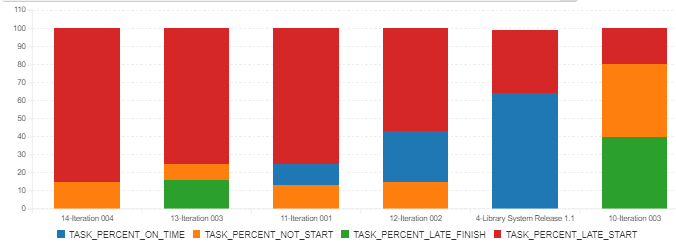Overview
Tasks represent the activities that need to be complete for the associated requirements to be completed. When tasks are not started or started late, they often finish late.
- In plan driven projects such as the waterfall or linear approaches, the late finish of any task potentially impacts the project schedule.
- In change driven projects such as the adaptive or agile approaches, the late finish of any task can imply the definition of done is incomplete for that user story to be included for deployment as part of that release.
So, it is always good to promote monitoring of the tasks within a release so that any schedule delays can be avoided.
Criteria to Monitor
It is essential to understand that not all tasks are created equally. So, instead of looking at type of task which could be questionable due to the complexity and severity of the task, one can monitor the healthiness of the tasks created for the schedule completion.
- In waterfall or linear projects, the project manager frequently identifies the tasks for the team. In such projects, the hours associated with the project become critical.
- In change-driven projects, the team identifies the tasks themselves based on the user stories committed for the sprint/iteration. In such projects, the points associated with the requirements are more critical than the hours associated with the granular tasks.
Therefore, the tasks associated with a requirements mapped to a release or the tasks directly associated to a release can be evaluated based on progress identified on the tasks themselves.
SQL Query for Custom Graph
Given below is the SQL Query.
select
(Cast(R.RELEASE_ID as String) + "-" + R.NAME) as NAME,
R.TASK_PERCENT_ON_TIME,
R.TASK_PERCENT_NOT_START,
R.TASK_PERCENT_LATE_FINISH,
R.TASK_PERCENT_LATE_START
from
SpiraTestEntities.R_Releases as R
where
R.PROJECT_ID = ${ProjectId} and
R.IS_SUMMARY = False and
R.RELEASE_STATUS_NAME = "In Progress" and
R.TASK_PERCENT_LATE_START > 0
order by
R.TASK_PERCENT_LATE_START desc,
R.TASK_PERCENT_LATE_FINISH desc
Query Explanation
- All the data required for this query is retrieved directly from the releases section (SpiraTestEntities.R_Releases).
- To better represent the X-Axis, both the release id and the release name are needed because the release name can be same (Iteration 001) but the release ids will not be. So, a Cast operation is done on RELEASE_ID to convert it to a string and concatenate with a hyphen (-) followed by the NAME of the release.
- The order of columns selected is the order in which the severity needs to be checked. This makes it easier to review the graph on items stacked at the top.
- The where clause applies the following criteria
- Current project selection (PROJECT_ID = ${ProjectId}),
- Removes summary releases like the major release (IS_SUMMARY = False),
- Checks only for releases currently in progress (RELEASE_STATUS_NAME = "In Progress"), and
- Evaluates where the tasks have started late (TASK_PERCENT_LATE_START > 0)
- The result is ordered by late-start and late finish task percentage in the descending order
Graphical Output
Given below is an example of this output.

Graph Interpretation
- The first area to focus on is the late_start tasks. Even when the duration on the task is accurate or the resource assigned to the task is capable, late start frequently leads to late finish. In the graph, we can see the red bar seems to be shrinking constantly indicating that the team is effectively managing this late start.
- The second area to focus on is the late finish tasks. Even if the tasks started on time, if there are other resource or schedule risks, then, these tasks may finish late. Schedule compression techniques may be called for in such cases and so this is an area to focus. In the graph, we can see that only two iterations were impacted. But, the Iteration 003 had more late finish tasks although only few of them associated with a late start requiring us to evaluate if other team issues exist.
- The third area to focus on is the tasks not starting. This could be due to many reasons such as the priority issues, resource optimization, etc. Nevertheless, trying to understand them helps manage the team effectively.
Thoughts to Consider
It is also good to consult the Earned Value Management techniques like Schedule Variance and Schedule Performance Index if the hours logged on the tasks are more important.